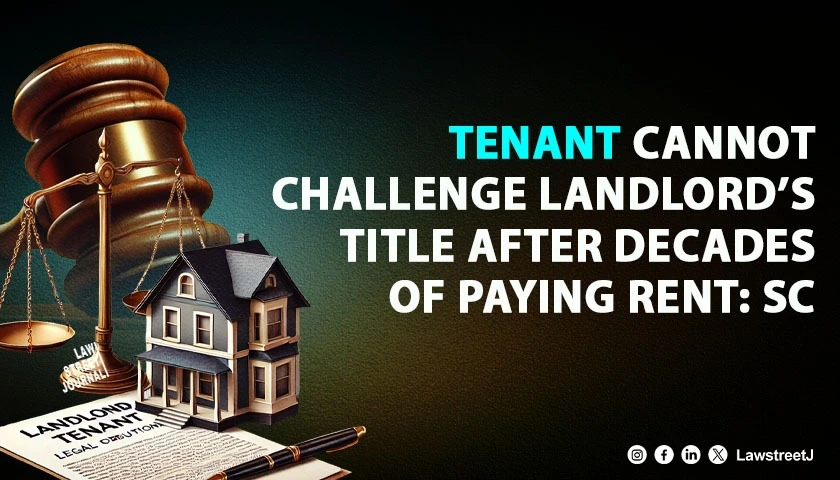New Delhi: The Supreme Court has delivered a significant judgment reinforcing the principle of estoppel in landlord-tenant relationships, holding that a tenant who entered into possession of rented premises through a rent deed executed by the landlord cannot subsequently challenge the landlord’s ownership after having paid rent for over half a century, as such conduct would amount to approbating and reprobating by taking inconsistent positions.
Justice K. Vinod Chandran, writing for a two-judge Bench also comprising Justice J.K. Maheshwari, set aside concurrent findings of three courts below and decreed the eviction suit, observing that the decisions were based on mere surmises and conjectures while ignoring material evidence.
The Court was dealing with a Civil Appeal arising from Special Leave Petition (C) No. 29500 of 2024 filed by Jyoti Sharma against Vishnu Goyal and another, involving a landlord-tenant relationship that commenced in 1953.
The dispute originated when the plaintiff, whose father-in-law, Ramji Das, had rented out a shop room to the defendants’ father, Kishan Lal, in 1953, filed a suit for recovery of rent arrears from January 2000 and eviction on grounds of bona fide need. The plaintiff claimed ownership through a Will dated May 12, 1999, executed by her father-in-law before his death on August 7, 1999, bequeathing the shop room to her.
The defendants disputed Ramji Das’s title, contending that the premises belonged to his paternal uncle, Sua Lal, who died in 1984, and assailed the Will as fraudulent. However, they admitted that the rent deed was executed by Ramji Das and that they had been paying rent to him through his son, the plaintiff’s husband.
The trial court dismissed the suit, expressing suspicion over the Will and finding no attornment of tenancy after Ramji Das’s death. The first appellate court initially remanded the matter, but after remand by the High Court, affirmed the trial court’s findings, which were further upheld by the High Court in second appeal.
Also Watch
Justice Vinod Chandran firmly rejected the tenant’s challenge to the landlord’s title, stating:
“The tenant having come into possession of the tenanted premises by a rent deed executed by the earlier landlord, cannot turn around and challenge his ownership.”
The Court emphasized the long history of rent payments, observing:
“It is also an admitted fact that from 1953, the predecessor of the defendants and the defendants, after their father’s death, had been paying rent to the said Ramji Das. The dispute regarding the title of Ramji Das could not have been raised by the tenant who had come into the premises by virtue of a deed executed by Ramji Das to whom, for more than half a century, the tenants were also paying rent.”
On the validity of the Will, the Supreme Court noted that the plaintiff had obtained a probate order dated February 9, 2018 from the Additional District Judge. Though the High Court had rejected the application to produce this order under Order XLI Rule 27 CPC, Justice Vinod Chandran observed that when an order of probate was produced—though not mandatory—the plaintiff’s claim through the Will attained legal sanctity and could not have been brushed aside.
The Court rejected the trial court’s suspicion of the Will on the ground that nothing was kept aside for the testator’s wife, stating that such a consideration was not a valid basis to doubt the testator’s intention or the genuineness of the bequest.
On the standard of proof required, Justice Vinod Chandran clarified that in an eviction suit, the proof of ownership of the tenanted premises is not to be scrutinized as strictly as in a suit for declaration of title.
The Court also found that ownership was clearly established through Exhibit P-18, the relinquishment deed executed by Sua Lal in 1953, on the strength of which Ramji Das had let out the disputed shop room to the defendants’ father.
On the issue of attornment of tenancy, the Court recorded that the plaintiff’s husband had testified that he collected rent after his father’s death on behalf of his wife, and that the defendants admitted to having not paid any rent from January 2000 onwards. The Court also relied on a registered notice sent by the plaintiff to the defendants asserting her ownership and demanding rent.
Regarding bona fide need, Justice Vinod Chandran found it established, noting that there was no dispute regarding the sweets and savouries business carried on in the adjacent shop room, nor regarding the fact that the plaintiff’s sons had joined the business and that the plaintiff intended to participate in and expand the business into the tenanted premises.
The Court took strong exception to the concurrent findings of all three courts, observing that they had failed to consider material evidence and had rendered perverse findings based on mere surmises and conjectures.
Justice Vinod Chandran therefore set aside the orders of the courts below and decreed the suit, directing recovery of rent arrears from January 2000 till handing over of possession, and ordering eviction on grounds of default in payment of rent as well as bona fide need.
Considering the long duration of tenancy, the Court granted six months’ time to the respondents to continue in possession, subject to filing an undertaking before the trial court to pay rent arrears within one month and to hand over vacant possession within six months. The undertaking was to be filed within two weeks, failing which the plaintiff would be entitled to seek summary eviction.
Mr. Puneet Jain, Senior Advocate, appeared for the appellant, while Mr. N.K. Mody, Senior Advocate, appeared for the respondents.
Case Title: Jyoti Sharma v. Vishnu Goyal & Anr.











